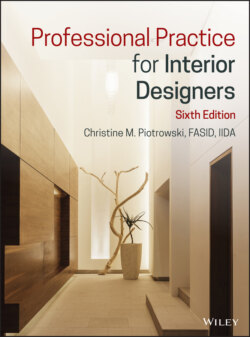Читать книгу Professional Practice for Interior Designers - Christine M. Piotrowski - Страница 164
ETHICAL STANDARDS
ОглавлениеYou have no doubt heard about the ethical standards of attorneys and those in the medical profession. When we hire this type of professional, we expect them to behave in an ethical manner. Ethical standards define what is right and wrong in relation to the professional behavior of any group that considers it to be a profession. It expects the members of that profession to conduct itself in an ethical manner.
Ethical standards and behavior have always been a concern of the interior design profession and professional associations. Adherence to the “Code of Ethics and Professional Practice” was expected of members of the AID in its earliest years.1 In fact, the AID Code of Ethics and Professional Practice was published in a professional practice manual at least as early as 1961.2
Establishment of ethical standards is not limited to associations that expect ethical behavior of their members. Jurisdictions that pass legislation for title registration, practice acts, or other legal recognition often include ethical standards and usually disciplinary standards for those who violate the statutes. Furthermore, those in the profession—regardless of association, legislative edict, or choice to be part of this profession—should feel an obligation to behave in an ethical manner and abide by an ethical standard.
Ethical standards and behavior affect interior designers in many ways. Naturally, they have an impact on the relationships between the designer and his or her client. However, serious ethical situations may arise between the designer and those with whom the designer must work in the interest of the client. It is not inconceivable for ethical issues to arise between an interior designer and contractors, vendors, craftspeople, and others in the trade and the wider design–build industry.
Many situations involving ethical standards and behavior affect the business of design. Some of these situations include the creation of contracts, marketing activities, budgeting, employee management, and financial activities. The interior design professional also owes a duty of ethical behavior toward others in the profession, whether they are other employees, the employer, or colleagues at other design firms.
The teaching and discussion of ethics and an enforceable code of ethics from professional associations provide definable and enforceable standards for this profession. However, a code of ethics cannot by itself produce ethical behavior. Ethical behavior must come from individual designers themselves in their daily dealings with clients, peers, the public, and allied professionals.
